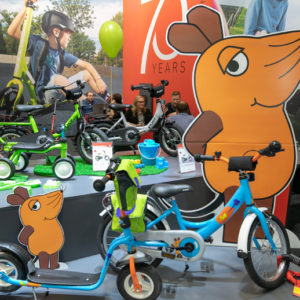Öko-Test gives clear verdict on biscuits for babies and toddlers

Latest news

-ADVERTISEMENT- The wellness and fitness trend has arrived in the …

The fight against environmental destruction and the climate crisis are …

Anyone looking for new products in the field of toys, …

It is a market with huge dimensions and great potential. …

For companies, a social media presence has become indispensable and …

Hardly anything disturbs customers as much as waiting at the …

Research by TV station RBB has shown that some outlet …

The industry association Licensing International (formerly LIMA) has honored outstanding …

Communications manager Hannah König and managing director Stephan Schenk are …

The toy dealer wants to leave his insolvency behind him. …
Öko-Test tested six children’s biscuits and above all found sugar, fat pollutants and mineral oil. Only one cookie received the verdict “sufficient”.
The biscuits tested almost all failed the test. The alternative: don´t let Children and babies get used to cookies in the first place. According to the Öko-Test, children under the age of one should not eat cookies at all, infants only very rarely. The consumer magazine thus criticises the fact that according to the manufacturer the biscuits are suitable for use from six or eight months. Öko-Test: “Sugar promotes caries, is involved in the development of overweight and helps people get used to sweets”. In addition to sugar contents of up to 26.4 percent, carcinogenic fat pollutants and mineral oil impurities were also found.
Almost all biscuits contaminated
In one of the biscuits a very strongly increased content of saturated hydrocarbons MOSH/ POSH was found. “MOSH can accumulate in the body and have damaged organs such as the liver in animal experiments. POSH are not yet so well investigated”, the evaluation says. All other biscuits had “increased” values. “The residues can, for example, pass through the packaging to the food, or already during production, when the raw materials come into contact with lubricating oils”, says Öko-Test.
Also on the list of ingredients: flavour, artificial vitamins, iron and minerals. Biotechnological-natural and artificial flavors are used in foods to balance out quality differences and standardize the product. “The Federal Institute for Risk Assessment (BfR) recommends that foods should not be fortified with iron because high, uncontrolled iron intake can increase the risk of certain diseases. Only a few foods are granted exemptions for enrichment,” says the current issue. With the exception of Alnatura spelt biscuits, all biscuits tested are contaminated with saturated hydrocarbons.
Öko-Test recommends looking at list of ingredients
In addition, palm oil or palm fat contaminated with fat pollutants was found in two varieties. The food authority Efsa classifies the glycidol, which is released in the gastrointestinal tract when consumed, as harmful to the genetic make-up. The released 3-MCPD has damaged the kidneys in animal studies. Palm oil has to be declared and can therefore be easily recognized by consumers. A quality indicator for biscuits is the use of butter instead of vegetable fats. This can be checked in the list of ingredients.
There are alternatives
In an Öko-Test study last year, the following biscuits scored “harmless” and “very good”: Sesame Street Ernie & Bert biscuits, Biscotto butter biscuits (Aldi Nord) and Choco Bistro butter biscuits (Aldi Süd).
You might be also interested in:
Öko-Test finds harmful substances in plasticine for children
Image: iStock
Link: The complete study can be found here
//CF




Leave a Reply